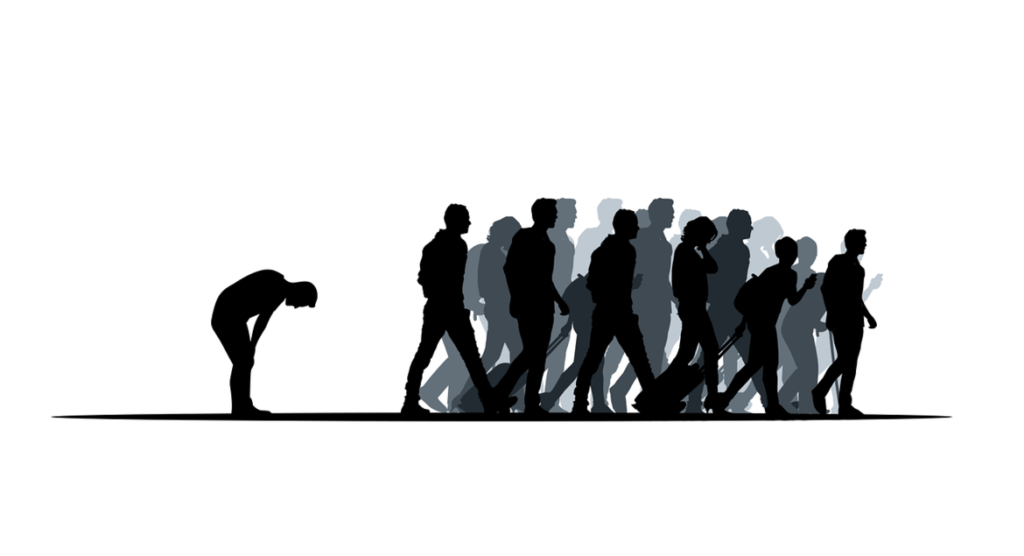Anxiety over how other people perceive you is a cause of social anxiety. Social anxiety disorder is diagnosed when your social anxiety significantly impairs your ability to function in society, but social anxiety may still be present without being diagnosed with it. Professional diagnosis is necessary. Unlike social apprehension and discomfort, social anxiety goes beyond that. Every now and then, we all worry about what others think of us. Social anxiety manifests itself in many areas of life, though it is a constant and severe pattern of worry. Taking that into consideration, let’s look at some of the signs and symptoms of social anxiety.
Table of Contents
Signs of Social Anxiety
Being Absent from Conversations Because you are Preoccupied with your Problems
One of the most typical ways social anxiety is described is as making it difficult to be fully present in conversations. For example, suppose you’re in a crucial meeting with a potential client. And, no matter how hard you try to focus on what they’re saying, you’re constantly distracted by a swarm of anxieties like Unfortunately, even if your worries aren’t real, they can become a self-fulfilling prophecy: Because you’re devoting so much time and attention to your fears, you’re devoting less mental energy and resources to thinking about and contributing to the real conversation. The more you feel you don’t contribute to the conversation, the more worried you become until you make mistakes or can’t articulate your thoughts because of the anxiety that is consuming your mind. Also, Read: Why do some people want to be alone?
Relationship Issues Involving Intimacy or Commitment
The body perceives danger, so it puts you in a fight or flight mode in order to protect you. Because of your body’s constant struggle to keep you safe, it is not surprising that being vulnerable and expressing yourself will be a challenge. However, all healthy relationships, particularly sexual partnerships, are predicated on closeness. So, if you are unable to be vulnerable, you drastically limit your potential to grow and deepen your connections, which might eventually lead to conflict or difficulty within the partnership itself.
Root Cause of Social Anxiety
What causes social anxiety? Many people struggle with social anxiety throughout their lives. For one instance, different types of social anxiety are likely to be caused by different factors. I bring this up because it’s dangerous to believe that there is only one reason for social anxiety. And that if you simply figure it out, you’ll be able to crack the code and put an end to your fight. There are probably different factors causing your social anxiety than those that cause your mother’s, which are different factors from those that cause your boss’ social anxiety. As a result, in order to understand the reasons for social anxiety, I believe it is critical to distinguish between initial causes and maintaining causes. As a result, people being fixated on the first causes of their fear and neglecting the ongoing causes of their fear is one of the most common errors I see. Firstly, let me explain the difference between maintaining initial causes. In my opinion, while learning the cause or origin of the origins of your social anxiety may be interesting and validating, it is not always useful when it comes to overcoming that anxiety today. Your current habits and behaviours keep your social anxiety alive, no matter what triggers it in the past.
This means that if you’re serious about conquering your social anxiety, your primary focus should be on identifying and eliminating the root causes of your social anxiety. The following are some of the most common long-term causes of social anxiety: Before we get into some practical tactics for actually conquering your social anxiety, I’d like to make one more remark about what’s causing it to persist and even worsen. When you look at the list of common sustaining causes of social anxiety, one thing they all have in common is that they often provide the short-term reprieve from worry at the expense of a long-term rise in it.
How to Overcome Social Anxiety?
Make a List of your Social Anxiety Triggers
It is important to remind yourself that you are not always socially anxious, even if you suffer from social anxiety. You probably have people in your life that you feel comfortable around. Your day is filled with plenty of non-social times, so you won’t be experiencing social anxiety all of the time.
Manage your Worrying Behavior
A person’s level of anxiety is directly related to the level of worry he or she experiences. As with any other form of worry, social anxiety is no different. Thus, stop worrying about social situations if you want to be less nervous.
Avoid Coping Mechanisms such as Alcohol or Drugs
It is generally not a good idea to cope with social anxiety. Two fundamental flaws exist in the coping strategy approach, in particular: The overall attitude of coping with social anxiety is ultimately self-defeating, regardless of whether it’s impulsive deep breathing techniques, going to your happy zone, or taking shots of vodka. Specifically, coping with social anxiety is primarily done through the use of alcohol and marijuana.
You’re not by yourself. You, like many others seeking relief, may have resorted to medication for assistance. Although antianxiety medications might alleviate your anxiety, the tranquilly may come at a cost in the shape of negative effects. Some of the most common drawbacks of drug-assisted anxiety treatment are difficulty sleeping, diminished libido, jitteriness, and increased appetite.



